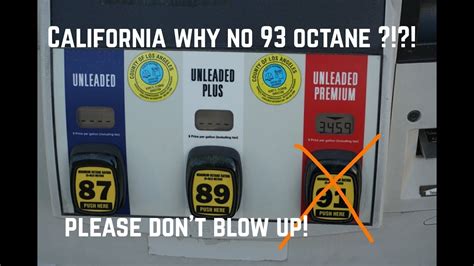Supercharge Your Engine: 91 to 93 Octane Conversion
Switching your car from regular (91 octane) to premium (93 octane) fuel might seem like a small change, but it can have a significant impact on your engine's performance and longevity. This comprehensive guide explores the benefits, drawbacks, and practical considerations of upgrading from 91 to 93 octane fuel. We'll delve into the science behind octane ratings, address common concerns, and empower you to make an informed decision for your vehicle.
What is Octane and Why Does it Matter?
Octane rating measures a fuel's resistance to knocking or pinging – the uncontrolled explosion of the air-fuel mixture in your engine's cylinders. Higher octane numbers indicate greater resistance to knocking. Knocking can cause damage to engine components, reduce performance, and even lead to costly repairs. While many modern engines are designed to tolerate lower octane fuels, using a higher octane than recommended can offer several advantages.
Does higher octane always mean better performance?
Not necessarily. While higher octane fuel can lead to improved performance in certain engines designed for it, it won't automatically make a substantial difference in vehicles calibrated for lower octane fuel. Using higher octane in an engine not designed for it won't provide any noticeable performance gains and may even be a waste of money.
Benefits of Upgrading to 93 Octane
- Improved Engine Performance: In vehicles designed for premium fuel, 93 octane allows for more aggressive ignition timing, resulting in increased horsepower, torque, and potentially better fuel efficiency. This is because the fuel can withstand the higher compression without knocking.
- Reduced Engine Knock: The primary benefit is the elimination of knocking or pinging, protecting engine components from damage and extending engine lifespan.
- Smoother Engine Operation: Many drivers report a smoother, quieter engine operation with higher octane fuel.
- Potential for Increased Fuel Economy: While not guaranteed, some drivers experience slightly improved fuel economy with higher octane fuel, especially under demanding driving conditions. However, this isn't consistent across all vehicles.
Drawbacks of Upgrading to 93 Octane
- Increased Fuel Cost: The most obvious drawback is the higher price of premium fuel. This cost increase needs to be weighed against the potential benefits.
- No Benefit for Certain Engines: Using 93 octane in an engine designed for lower octane won't provide performance improvements and is simply a waste of money. Your owner's manual will clearly specify the recommended octane rating.
- Misinformation: There's a lot of misinformation surrounding octane and its effects. It's crucial to rely on factual information and your vehicle's specifications.
Will using 93 octane damage my engine?
No, using 93 octane in a car designed for lower octane fuel will not directly damage your engine. Your engine's computer will adjust the ignition timing to compensate for the higher octane, preventing knocking. However, you won't see any performance benefits, and you'll be spending more money on fuel unnecessarily.
How to Determine if 93 Octane is Right for Your Vehicle
Always consult your owner's manual. It clearly states the recommended octane rating for your specific vehicle. Ignoring this recommendation is not advisable. Using a lower octane than recommended can lead to engine damage, but using a higher octane is generally safe, though ultimately ineffective unless your vehicle is designed for it.
What if my car is designed for 91 but I accidentally put in 93?
Don't worry; this is not a significant problem. Your car will run fine on 93 octane. It won't damage the engine, but there won't be any noticeable performance improvements either. Simply use the correct octane rating for future fill-ups.
Conclusion
The decision to upgrade from 91 to 93 octane fuel depends entirely on your vehicle's specifications and your driving habits. If your car is designed for premium fuel (check your owner's manual!), the potential benefits of using 93 octane can be significant. However, using higher octane in a vehicle not designed for it is wasteful and will not improve performance. Prioritize consulting your vehicle's manual to ensure you're using the correct fuel grade for optimal performance and engine longevity.

